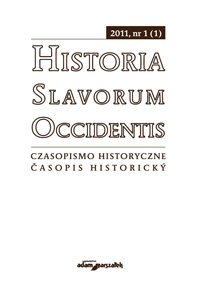Polska okresu nowożytnego a czeska wiedza historyczna (do końca XVII wieku)
Poland in Early Modern Times vs. Czech Historical Knowledge (up to the eighteenth century)
Author(s): Pavel Boček, Tomáš KnozContributor(s): Grażyna Bil-Knozová (Translator), Markéta Tardy Páralová (Translator)
Subject(s): History, Comparative history, Modern Age, 16th Century, 17th Century, 18th Century
Published by: Wydawnictwo Adam Marszałek
Keywords: Poland in Modern Age;Modern Age; Czech Historical Knowledge
Summary/Abstract: In the twentieth century Polish history was a fixed part of Czech historiog-raphy, yet it was the main area of Bidl’s and Macůrk’s studies only. Recently we may observe a significant change, as Polish and Czech historiography co-operate more closely with each other. Hence for Czech historians (i.e. Pánek, Bečková) „Polish issues” are more often a natural part of universal early modern history. We also observe reinterpretations of old research problems and emerging of New ones. Thanks to Miloš Řezník Elary modern Polish his-tory is set in a new framework. There are plenty of new research projects on the eighteenth century Polish history, new books and papers on Polish his-tory are being publishes, thereby some of them are lectures on a scientific themes for the general public. Conceptualization of Polish history by Czech scholars is structured by works of Jiři Vykoukal on Poland in the eighteenth century. 1. History of Poland. 2. History of Czech-Polish relations. 3. Region-al history. There is also new interesting research field emerging. It is study on perceptions and interpretations of Polish history by Czech historians, „pub-lic opinion” and students. Thus the study of Polish history changes into the study of contemporary perception of Polish history in Czech (resp. Moravi-an) milieu. ontroversies in the perception of Polish history seem to be qua-si-controversies only. They began to disappear together with disappearance of national and étatistic elements of Czech historiography. Yet, they are still present – in a latent form – in the perception of Polish history by general public (particularly due to the journalism and the literature of fact). Some remains of this stance are also visible in the above-mentioned perception of history as „representation of the past”.
Journal: Historia Slavorum Occidentis
- Issue Year: 2011
- Issue No: 1
- Page Range: 99-134
- Page Count: 36
- Language: Polish

